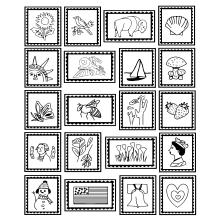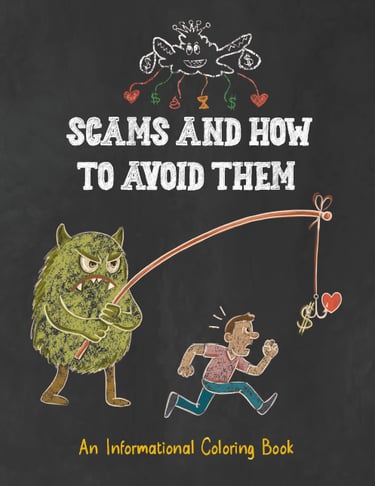Scams and How to Avoid Them
We are bombarded by scams. It’s always been bad, but impostors on the internet have made it even worse. We can reduce the risks, though. Scams and How to Avoid Them looks at how scams work, the emotional buttons scammers press, and how to keep ourselves safer from them.
We include more than 75 coloring pages featuring in-depth details and explanations about scams.
























We start by looking at the heart of scams: emotional buttons and how impostors can press them. Online scams may have started with the legendary "Nigerian Prince" looking to share his inheritance, but they've morphed far beyond that starting point.
There are ways to protect against scams and we cover many in this informative coloring book.
One of the best things to keep in mind is that money should be like a baton, fully clearing one stage of a transaction before being sent to another stage. A huge number of scams depend on them sending you a "payment" (which is fake) and expecting a refund or other payment back from you (in hopes it's real).
Beware of payment requests made for gift cards, cypto, or "Friends and Family" (non-refundable) methods. Scammers love getting money these forms because they're largely not refundable. The mere request for a gift card, especially if someone is claiming to be from a government agency, is a glaring red flag.
Fake ads are common on social media platforms. "Discounted forever stamps" are a common example, despite warnings (direct from USPS) and countless consumers reporting the scams to the platforms themselves.
"Pig butchering" scams are particularly nefarious. The scammer patiently nurtures a relationship, possibly romantic, and eventually asks the victim to "invest" in crypto or otherwise give them money. This violates not just someone's wallet, but their sense of worth, as the "relationship" was never real.
Don't have anyone you feel comfortable talking with about the possible scammer? Talk to a pet. Talk to anyone or anything: Just hear the words aloud. "The water service wants me to pay them in... gift cards?" It can help just to walk through all of the steps with yourself.
What to do if you think you've been, or in the process of being, scammed? First, talk to a friend. Scammers will try to steer you away from doing this, and even try to promise you to secrecy... they know talking to your friends will probably help you, so they work hard to prevent that.
Auction scams are interesting: It's easy to have a lot of emotional buttons pressed in an auction. Many, and maybe most, auctions are legitimate, but scams can find a natural home there. Beware of the auctions advertising "Picassos, Rolls Royces", etc.
We also talk about in-person scams: moving scams, door-to-door scams, car sales that could go awry, home improvement service people who are more like criminals than than anything else, and more.
We also talk about "dark patterns" and other behaviors that walk the line between legal and illegal. For example, "money back guarantees" may have onerous terms & conditions, requiring the victim to practically jump through flaming hoops to get their money back.
We urge victims and attempted victims to not engage with scammers: Even a simple text response could put your phone number on a list to be passed around to more scammers. And definitely, please do not educate scammers: don't chastise their spelling or grammar, don't point out that an American would be unlikely to describe a distance in kilometers, etc. Don't help scammers become more informed.
Understanding Bad Things
AmpersandData, LLC, d/b/a Understanding Bad Things
© 2024. All rights reserved.


